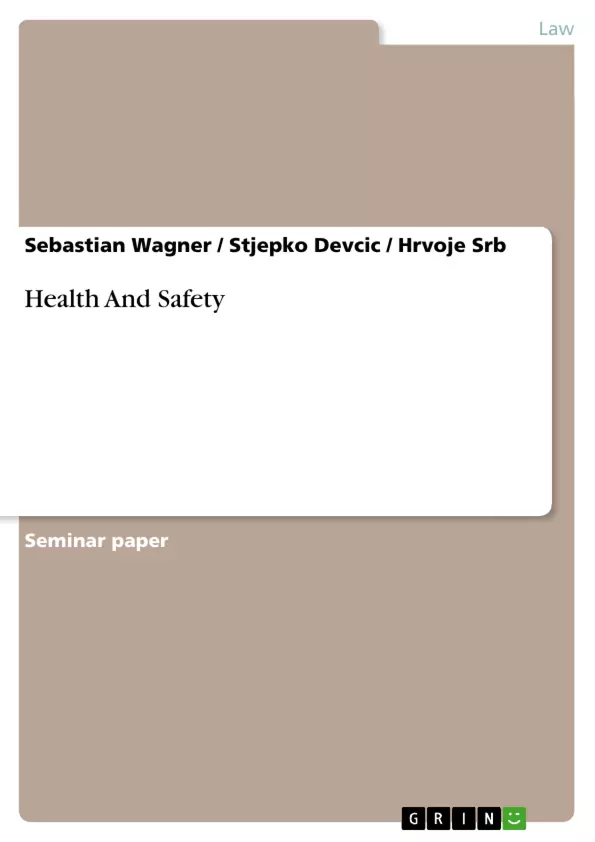Health and Safety in the working environment
The hospitality industry that we focus on is an industry many people are involved in as employers as well as employees, and the work is very widespread, through many different requirements and departments in a hotel for example. Therefore there are lots of threats for the health and safety of people involved such as e.g. slippery floors, sharp or dangerous kitchen equipment or chemicals used for cleaning. In the sector of health and safety both civil law and criminal law are covered, the civil law to compensate losses of people suffering from accidents and the criminal law for creating and keeping certain standards of safety in the working environment through the Health and Safety at Work etc. Act 1974 for example (United Kingdom).
[...]
Inhaltsverzeichnis (Table of Contents)
- Health and Safety in the working environment
- The Health and Safety at Work etc. Act 1974
- The Offices, Shops and Railway Premises Act 1963
- Occupational Safety and Health Act
- Cases
- Duties of employers
- Duties of employees
- Special safety regulations
- Conclusion
- Bibliography
Zielsetzung und Themenschwerpunkte (Objectives and Key Themes)
This term paper focuses on the health and safety regulations in the hospitality industry. It examines key legislation in the UK and US and outlines the duties of employers and employees in ensuring a safe working environment.
- The importance of health and safety regulations in the hospitality industry
- The legal framework governing health and safety at work in the UK and US
- The roles and responsibilities of employers and employees in maintaining workplace safety
- The specific safety regulations applicable to different areas within the hospitality industry
- The consequences of failing to comply with health and safety legislation
Zusammenfassung der Kapitel (Chapter Summaries)
- Health and Safety in the working environment: This chapter introduces the importance of health and safety regulations within the hospitality industry, highlighting the various threats to employee well-being. It briefly outlines the legal framework governing health and safety, emphasizing the interplay of civil and criminal law.
- The Health and Safety at Work etc. Act 1974: This chapter delves into the main purpose and key provisions of the Health and Safety at Work etc. Act 1974 in the UK. It discusses the act's aim to provide general rules for employee safety across all industries, with particular focus on its application to the hospitality sector.
- The Offices, Shops and Railway Premises Act 1963: This chapter examines the Offices, Shops and Railway Premises Act 1963, highlighting its relevance to the hospitality industry. It discusses specific provisions regarding cleanliness, lighting, temperature, sanitation, seating, and working space, emphasizing the minimum working conditions required for various employees in the hospitality sector.
- Occupational Safety and Health Act: This chapter introduces the Occupational Safety and Health Act of 1970 in the US, highlighting the role of the Occupational Safety and Health Administration (OSHA). It outlines the key activities of OSHA, including establishing standards, conducting inspections, and enforcing regulations.
Schlüsselwörter (Keywords)
The primary keywords and focus topics of this term paper include health and safety regulations, hospitality industry, UK and US legislation, employer and employee duties, workplace safety, specific safety regulations, and consequences of non-compliance.
Frequently Asked Questions
What is the main purpose of the Health and Safety at Work etc. Act 1974?
The Act provides a comprehensive legal framework to ensure the health, safety, and welfare of employees across all industries in the UK, including the hospitality sector.
What are the specific duties of employers in the hospitality industry?
Employers must provide a safe working environment, maintain equipment, ensure safe handling of chemicals, and provide adequate training and supervision to prevent accidents like slips or burns.
What does OSHA stand for and what is its role in the US?
OSHA stands for the Occupational Safety and Health Administration. Its role is to establish and enforce safety standards, conduct inspections, and ensure healthy working conditions in the United States.
How does civil law differ from criminal law regarding workplace safety?
Civil law focuses on compensating individuals for losses or injuries suffered in accidents, while criminal law aims to punish those who fail to maintain legal safety standards.
What are common health threats in a hotel or restaurant environment?
Common threats include slippery floors, sharp kitchen tools, heavy lifting, and exposure to cleaning chemicals.
- Quote paper
- Sebastian Wagner (Author), Stjepko Devcic (Author), Hrvoje Srb (Author), 2002, Health And Safety, Munich, GRIN Verlag, https://www.grin.com/document/7963



